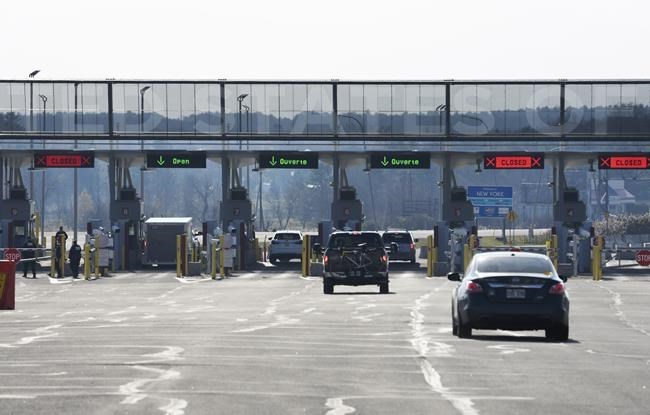MONTREAL — Residents of a New York border town say they're eager to welcome Canadians now that the United States has eased land border restrictions, but they worry that costly COVID-19 testing rules will keep many travellers away.
On Monday, Christmas music floated down the halls of the Champlain Centre mall in Plattsburgh, N.Y., about an hour south of Montreal, where some retailers dreamt of the return of tourist dollars — perhaps in time for the holidays.
"We cannot wait to have Canadian shoppers come back," Emily Moosmann, the mall's marketing director, said in an interview. "We miss hearing French in the hallway; we miss seeing their faces."
To lure shoppers back, the mall created a web page — headed by a large maple leaf — highlighting new stores that have opened, local COVID-19 test sites and special discounts for Canadian residents.
"About 30 per cent of our traffic is Canadian, so, not seeing them here, we definitely feel the impact," she said. While there were only a few cars with Quebec licence plates in the parking lot on Monday, Moosmann said retailers were optimistic things would pick up on the weekend.
Charles Loscalzo, the manager of Bookburgh Books, said he was offering a 10 per cent discount to Canadian customers, and he was doing anything he could to make sure travellers feel at ease given the ongoing COVID-19 pandemic.
"We have hand sanitizers, we're observing social distancing," he said in an interview behind the counter. "Masks here are optional, but we wear them even though everyone is vaccinated."
The United States on Monday reopened its land border with Canada to non-essential travel for the first time since the onset of the COVID-19 pandemic in March 2020. Several retail managers and residents who spoke to The Canadian Press said they welcomed the reopening but expressed concern about ongoing restrictions.
The United States requires that travellers be fully vaccinated. But Canada also requires anyone entering or re-entering the country to show proof of a negative PCR test — which costs around $200 in Montreal private clinics.
Plattsburgh Mayor Christopher Rosenquest said Monday's reopening will allow for the return of business travel, snowbirds passing through and people with homes or family in the area who are likely to stay longer — which he calls a "good first step."
Rosenquest, however, called on the Canadian government to scrap the testing requirement, which he said would probably keep away the day trippers the city relied on in pre-pandemic times.
"We are looking forward to seeing those restrictions loosened up for more casual tourists that are coming to do some shopping or to get their oil change or do some travelling and hiking to the Adirondacks, things like that," he said in a recent interview.
It's unclear how big an economic impact the border closure has had on Plattsburgh's economy. While several retailers who spoke with The Canadian Press said the closure has hurt their bottom line, Rosenquest said sales tax — usually an indicator of tourism — only went down about three per cent at the beginning of the pandemic, which he attributes to local people spending more of their dollars at home. He said, however, certain businesses that cater to tourists, such as boating, have been harder hit.
But Rosenquest said the impacts of the border closure go beyond economic.
"We miss our Canadian friends, we really do," he said. "It's such a pleasant cultural exchange to have Canadian travellers come and meet our friends, practise our French a little bit here and there. We really do miss it."
In downtown Plattsburgh, the Antique Variety Mall had a steady stream of customers browsing vintage jewelry, furniture and Christmas decor.
District manager Rebecca Vanvalkenburg said sales had been down about 25 per cent or 30 per cent due to the lack of cross-border shoppers. But more importantly, she said, she was eager to reunite with the people she knows in Canada.
"I miss my friends from the north!" she said, adding that ties run deep between Quebec and upstate New York. She said many people have family and friends on both sides of the border.
After a year and a half of pandemic, she said it was time to scrap the testing requirement and allow the reunions both sides are craving.
"Open up and let people live," she said. "We've been through enough."
This report by The Canadian Press was first published Nov. 9, 2021.
Morgan Lowrie, The Canadian Press



